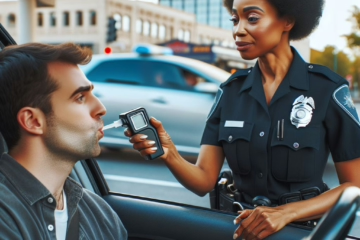Understanding the intricacies of criminal law in any jurisdiction is a complex task, and British Columbia is no exception. The province’s legal system is governed by a combination of statutes, case law, and legal principles that guide the prosecution and defense of criminal cases. One of the critical components within this framework is the criminality test, which is essential for determining the presence of criminal elements in a case. This article delves into the structure of criminal laws in British Columbia, the elements of the criminality test, the requirements for establishing criminality, and the navigation of criminal cases within the province.
Table of contents

Overview of Criminal Laws in British Columbia
Criminal laws in British Columbia are primarily governed by the Criminal Code of Canada, a federal statute that outlines offenses and prescribes penalties applicable across the country. This code is complemented by provincial legislation and regulations that address specific local issues, such as the enforcement of municipal bylaws or provincial offenses. Together, these legal instruments form a comprehensive framework that seeks to maintain public order, protect individuals and property, and ensure justice is served.
British Columbia’s legal system is an adversarial one, where the prosecution and defense present their cases before an impartial judge or jury. The burden of proof rests on the prosecution, which must establish the accused’s guilt beyond a reasonable doubt. This high standard is a fundamental principle of criminal law, ensuring that convictions are only secured when there is compelling evidence of wrongdoing.
The province’s legal landscape is also shaped by landmark decisions from higher courts, including the Supreme Court of Canada, which interpret and refine the application of criminal laws. These decisions often address complex legal questions, such as the admissibility of evidence or the interpretation of statutory provisions, and have a significant impact on how criminal cases are prosecuted and defended in British Columbia.
Key Elements of the Criminality Test
The criminality test is a critical mechanism in the criminal justice system, used to determine whether an individual’s actions constitute a criminal offense. It involves assessing whether the essential elements of a crime, such as intent and conduct, are present in a given situation. This test is pivotal in distinguishing between lawful and unlawful behavior, thereby safeguarding individuals from unjust prosecution.
One of the primary elements of the criminality test is mens rea, or the mental state of the accused at the time of the offense. This component considers whether the individual had the requisite intention or knowledge to commit the crime, as different offenses require different levels of intent. For instance, crimes like theft require a deliberate intention to deprive someone of their property, whereas negligence-based offenses may only necessitate a failure to meet a standard of care.
The second crucial element is actus reus, which refers to the physical act or omission that constitutes the criminal conduct. This aspect examines whether the accused’s actions or inactions were voluntary and directly led to the commission of the offense. Together, mens rea and actus reus form the backbone of the criminality test, ensuring that only those who meet these criteria are held criminally liable.
Understanding Criminality Requirements in BC
In British Columbia, understanding the requirements for establishing criminality involves a nuanced appreciation of the legal standards and evidentiary thresholds applicable in criminal proceedings. The prosecution must demonstrate both the actus reus and mens rea elements to satisfy the criminality test and secure a conviction. This dual requirement ensures that individuals are only punished for actions that are both wrongful and intentional.
The mens rea component can vary significantly depending on the nature of the offense. For example, some crimes, such as first-degree murder, require proof of premeditation and intent, while others, like manslaughter, may be based on recklessness or negligence. Understanding these distinctions is crucial for legal practitioners and defendants alike, as they directly influence the strategies employed in criminal cases.
In addition to these core elements, the legal system in British Columbia also considers defenses that may negate criminal liability. These defenses can include self-defense, duress, or mental disorder, among others. Successfully invoking a defense can absolve the accused of criminal responsibility, highlighting the importance of a comprehensive understanding of criminality requirements in navigating the legal process.
Navigating Criminal Cases in British Columbia
Navigating criminal cases in British Columbia requires a strategic approach that considers the unique aspects of the province’s legal system. Defendants and legal practitioners must be well-versed in the procedural rules governing criminal trials, including the rights of the accused, the admissibility of evidence, and the role of the judiciary. Familiarity with these elements is essential for effectively advocating for justice and ensuring fair trial outcomes.
One of the key challenges in navigating criminal cases is managing the evidentiary requirements needed to satisfy the criminality test. This involves gathering and presenting evidence that supports or refutes the presence of mens rea and actus reus. The complexity of this process often necessitates the expertise of skilled legal counsel, who can navigate the intricacies of evidence law and courtroom procedure.
Furthermore, criminal cases in British Columbia often entail interactions with various components of the legal system, including police, prosecutors, and courts. Effective communication and negotiation skills are crucial for securing favorable outcomes, whether through plea bargains, trial advocacy, or appeals. Understanding the broader context of the criminal justice system and its stakeholders is indispensable for successfully navigating the complexities of criminal cases in the province.
In conclusion, the criminality test is a fundamental aspect of the criminal justice system in British Columbia, serving as a critical tool for determining the presence of criminal elements in a case. By understanding the key elements and requirements of the criminality test, legal professionals and defendants can better navigate the complexities of criminal law in the province. The intricacies of this process highlight the importance of a thorough grasp of legal principles and procedural rules, ultimately contributing to the fair and just administration of justice in British Columbia.
Important: Please note that the information here is not meant to be legal advice. Do not solely rely on the information given here; it is important that you consult with a lawyer regarding any legal advice. Pax Law Corp. is not responsible for any reliance on the contents of this blog post. Any faces posted on this blog post is totally AI generated and they are not intended to represent any person in the real world. Any similarities are completely coincidental.
To book an appointment with a criminal lawyer please visit our booking page.
Frequently Asked Questions
- 1. What is the criminality test in British Columbia?
- The criminality test is used to determine whether an individual’s actions constitute a criminal offense by assessing both mens rea and actus reus.
- 2. What is mens rea?
- Mens rea refers to the mental state of the accused at the time of the offense, indicating intent or knowledge regarding the crime.
- 3. What is actus reus?
- Actus reus is the physical act or omission that constitutes the criminal conduct in a crime.
- 4. How is criminal law structured in British Columbia?
- Criminal law in British Columbia is governed by the Criminal Code of Canada and supplemented by provincial statutes and regulations.
- 5. What are the key elements of a crime?
- The key elements of a crime include mens rea (intent) and actus reus (conduct).
- 6. How does the burden of proof work in criminal cases?
- The burden of proof rests on the prosecution, which must establish guilt beyond a reasonable doubt.
- 7. What is the significance of the Supreme Court of Canada in criminal law?
- The Supreme Court interprets and refines criminal laws, affecting prosecution and defense strategies across Canada, including BC.
- 8. What types of defenses can be used in criminal cases?
- Common defenses include self-defense, duress, mental disorder, and alibi.
- 9. What is the difference between first-degree murder and manslaughter?
- First-degree murder requires premeditation and intent, while manslaughter may involve recklessness or negligence.
- 10. How does a criminal case proceed in British Columbia?
- A criminal case typically follows these stages: investigation, charges, pre-trial, trial, and potentially an appeal.
- 11. What role do police play in criminal cases?
- Police investigate crimes, gather evidence, and may lay charges against individuals suspected of criminal activity.
- 12. Can a defendant represent themselves in court?
- Yes, a defendant can represent themselves, but it’s generally advisable to have legal counsel due to the complexities involved.
- 13. What is the role of a prosecutor?
- A prosecutor represents the state in criminal cases, responsible for presenting evidence to prove the accused’s guilt.
- 14. How is evidence gathered in a criminal case?
- Evidence can be gathered through investigations, witness statements, forensic analysis, and documents.
- 15. What happens if a defendant is found not guilty?
- If found not guilty, the defendant is acquitted and cannot be tried again for the same offense due to double jeopardy.
- 16. What is a plea bargain?
- A plea bargain is an agreement where a defendant pleads guilty to a lesser charge in exchange for a lighter sentence.
- 17. How are sentencing decisions made?
- Sentencing decisions are made by the judge based on the severity of the crime, prior convictions, and mitigating or aggravating factors.
- 18. What is the role of the defense attorney?
- The defense attorney advocates for the accused, providing legal counsel, and presenting evidence and arguments in their favor.
- 19. What are municipal bylaws?
- Municipal bylaws are local laws established by municipalities that address specific issues within the community.
- 20. Can evidence obtained illegally be used in court?
- No, evidence obtained through illegal means may be deemed inadmissible in court.
- 21. What is an appeal in a criminal case?
- An appeal is a request to a higher court to review the decision of a lower court for errors in law or procedure.
- 22. What constitutes a fair trial?
- A fair trial ensures that the accused has the right to an impartial judge, legal representation, and the opportunity to present a defense.
- 23. How is criminal liability established?
- Criminal liability is established when both actus reus and mens rea are proven beyond a reasonable doubt.
- 24. What is the role of juries in criminal cases?
- Juries are responsible for determining the facts of the case and deciding whether the prosecution has proven the defendant’s guilt.
- 25. How do mental health issues affect criminal liability?
- Mental health issues can lead to defenses that negate liability, such as not being able to understand the nature of the act.
- 26. What is the difference between civil and criminal law?
- Civil law deals with disputes between individuals, while criminal law involves offenses against the state or society.
- 27. What is a summary conviction?
- A summary conviction is a less serious offense that typically carries lighter penalties and a simpler legal process.
- 28. What are indictable offenses?
- Indictable offenses are more serious crimes that typically carry harsher penalties and require a more complex trial process.
- 29. Can a case be dismissed before trial?
- Yes, a case can be dismissed if there is insufficient evidence to support the charges.
- 30. How does plea bargaining affect the legal system?
- Plea bargaining can reduce the number of cases going to trial, easing the burden on the court system.
- 31. What rights do accused individuals have in BC?
- Accused individuals have rights including the right to remain silent, the right to legal counsel, and the right to a fair trial.
- 32. What is self-defense in criminal law?
- Self-defense is a legal defense where an individual argues they acted to protect themselves from imminent harm.
- 33. How important is witness testimony in criminal cases?
- Witness testimony can be crucial in establishing the facts of a case, influencing the outcome significantly.
- 34. What role does evidence play in a criminal trial?
- Evidence is essential for establishing the elements of a crime and influencing the jury’s decision.
- 35. Can prior convictions affect sentencing?
- Yes, prior convictions can lead to harsher penalties in subsequent offenses.
- 36. What are restorative justice practices?
- Restorative justice focuses on repairing harm caused by criminal behavior through reconciliation between victims and offenders.
- 37. How can someone prepare for a criminal trial?
- Preparation involves understanding the charges, gathering evidence, and consulting with legal counsel.
- 38. What is a statement of defense?
- A statement of defense is a formal response by the accused to the charges, outlining their defense strategy.
- 39. Can a defendant appeal a guilty verdict?
- Yes, a defendant can appeal a guilty verdict based on legal errors or procedural issues during the trial.
- 40. How do plea deals impact victims?
- Plea deals can impact victims by potentially depriving them of their day in court, but they can also lead to quicker resolutions.
- 41. What is the role of forensic evidence?
- Forensic evidence provides scientific analysis of evidence, often playing a critical role in criminal investigations and trials.
- 42. How do bail hearings work?
- Bail hearings determine whether a defendant can be released from custody before trial and under what conditions.
- 43. What is the significance of case law?
- Case law provides judicial interpretations of statutes, shaping the application of criminal law through precedents.
- 44. How can someone find a criminal lawyer in BC?
- Individuals can find a criminal lawyer through referrals, legal directories, or local bar associations.
- 45. What are the consequences of a criminal conviction?
- Consequences can include imprisonment, fines, a criminal record, and limitations on employment and travel.



0 Comments